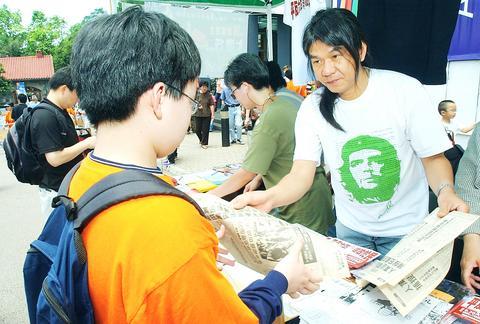Opposition lawmakers said they'll teach Chinese tourists about democracy as tens of thousands of mainlanders flood into Hong Kong during the weeklong May Day holiday.
Several lawmakers and other activists handed out leaflets about China's bloody crackdown on the democracy movement in Beijing's Tiananmen Square on June 4, 1989, to mainland visitors at Hong Kong's Victoria Peak yesterday.

PHOTO: AP
"End one-party dictatorship! Build a democratic China!" chanted the lawmakers as they unveiled a goddess of democracy statue on the Peak.
China's press is tightly controlled and the 1989 democracy protests, in which hundreds if not thousands of people were killed by the Chinese army, remains a taboo subject on the mainland, where people's speech and assembly rights are curtailed.
"We've always wanted to break through China's media censorship, and the influx of mainland tourists gives us a golden opportunity to do just that," said lawmaker and unionist Lee Cheuk-yan (
But the mainland visitors on the Peak seemed not so keen. Few stopped at an exhibition board to look at a display of photos and newspaper clippings of the 1989 protests. Others took the leaflets without reading them.
"I'm not interested," said Long Qing, a 25-year-old tourist from the central Chinese city of Wuhan. "This isn't something we usually talk about."
Long said she's heard about June 4, but wasn't sure what happened and isn't keen to find out more.
Charmaine Yang, a mainland trader from Beijing, said China has become more open since 1989 but she agrees it will still take time before people can openly discuss democracy on the streets.
Yang said she supported the Chinese student's demands at the time, but thinks China will only have greater democracy when the majority of people want to push for it.
"But their top priority now is a good economy and a decent living. When people have money, then they'll worry about freedoms and democracy," Yang said.
Calls to China's representative office here went unanswered early yesterday.
The lawmakers and activists also gave mainland visitors maps showing the places where Hong Kongers held massive rallies in recent months to demand full democracy in this former British colony that returned to Chinese rule in 1997.
Hong Kong enjoys western-style freedoms that are unheard of on the communist mainland, but has remained partially democratic since the handover.
Beijing crushed Hong Kong's hopes for quickly attaining universal suffrage by ruling Monday that the territory can't directly elect its next leader in 2007 or all lawmakers in 2008.
Many here have been clamoring for the right to directly elect the chief executive and all lawmakers. Ordinary Hong Kongers now have no say in picking their leader, but they will directly choose 30 of 60 legislators in September elections, up from 24 last time.
Critics, including the US and Britain, charged that Beijing's decision has harmed Hong Kong's promised autonomy.
Full democracy is set out as an eventual goal in Hong Kong's mini-constitution but no timetable is given.

Indonesia yesterday began enforcing its newly ratified penal code, replacing a Dutch-era criminal law that had governed the country for more than 80 years and marking a major shift in its legal landscape. Since proclaiming independence in 1945, the Southeast Asian country had continued to operate under a colonial framework widely criticized as outdated and misaligned with Indonesia’s social values. Efforts to revise the code stalled for decades as lawmakers debated how to balance human rights, religious norms and local traditions in the world’s most populous Muslim-majority nation. The 345-page Indonesian Penal Code, known as the KUHP, was passed in 2022. It

‘DISRESPECTFUL’: Katie Miller, the wife of Trump’s most influential adviser, drew ire by posting an image of Greenland in the colors of the US flag, captioning it ‘SOON’ US President Donald Trump on Sunday doubled down on his claim that Greenland should become part of the US, despite calls by the Danish prime minister to stop “threatening” the territory. Washington’s military intervention in Venezuela has reignited fears for Greenland, which Trump has repeatedly said he wants to annex, given its strategic location in the arctic. While aboard Air Force One en route to Washington, Trump reiterated the goal. “We need Greenland from the standpoint of national security, and Denmark is not going to be able to do it,” he said in response to a reporter’s question. “We’ll worry about Greenland in

PERILOUS JOURNEY: Over just a matter of days last month, about 1,600 Afghans who were at risk of perishing due to the cold weather were rescued in the mountains Habibullah set off from his home in western Afghanistan determined to find work in Iran, only for the 15-year-old to freeze to death while walking across the mountainous frontier. “He was forced to go, to bring food for the family,” his mother, Mah Jan, said at her mud home in Ghunjan village. “We have no food to eat, we have no clothes to wear. The house in which I live has no electricity, no water. I have no proper window, nothing to burn for heating,” she added, clutching a photograph of her son. Habibullah was one of at least 18 migrants who died

Russia early yesterday bombarded Ukraine, killing two people in the Kyiv region, authorities said on the eve of a diplomatic summit in France. A nationwide siren was issued just after midnight, while Ukraine’s military said air defenses were operating in several places. In the capital, a private medical facility caught fire as a result of the Russian strikes, killing one person and wounding three others, the State Emergency Service of Kyiv said. It released images of rescuers removing people on stretchers from a gutted building. Another pre-dawn attack on the neighboring city of Fastiv killed one man in his 70s, Kyiv Governor Mykola